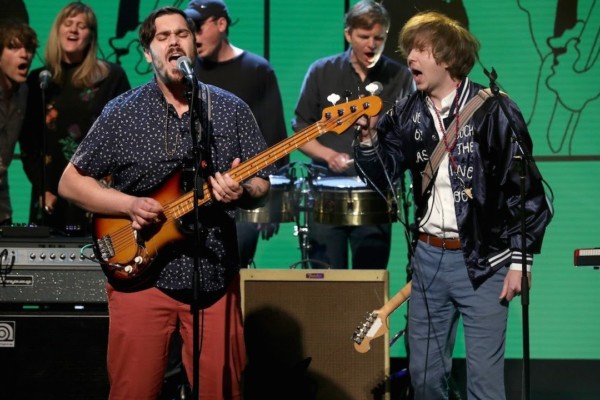Wide Awake: An Interview with Sean Yeaton
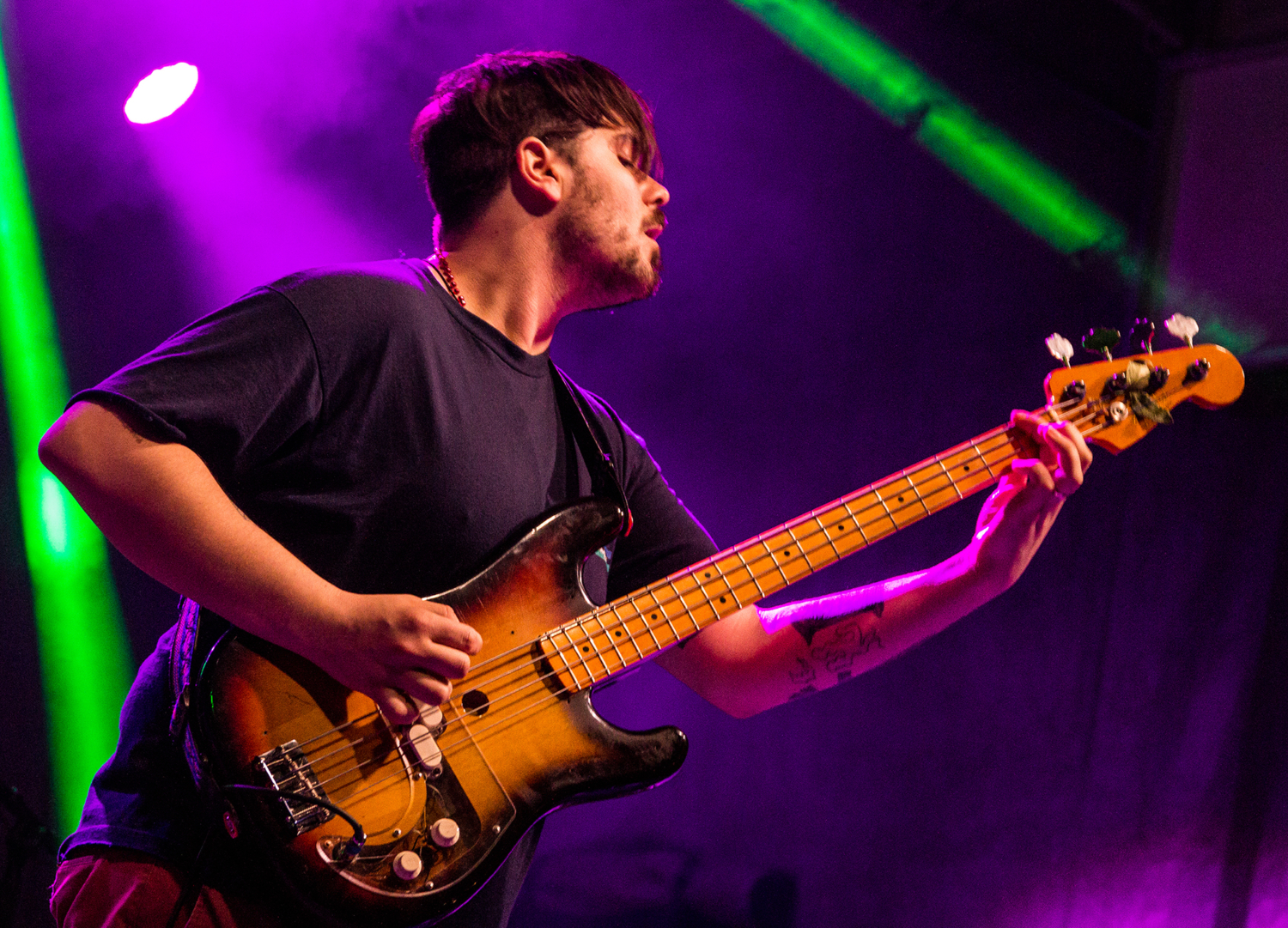
The new Parquet Courts album, Wide Awake!, is an amazing listen that displays the band’s continued growth and evolution. That’s especially true for bassist Sean Yeaton, whose hooky bass lines serve as a melodic focal point in the music.
Like many of us, Yeaton started as a guitarist. He switched to bass specifically for Parquet Courts and although he’s played in the band for all of their eight years together it wasn’t until recently that he felt comfortable with the instrument. It’s a fact you wouldn’t know from listening to Wide Awake! since it has killer bass lines on songs like “Total Football” and the title track, but Yeaton humbly admits as much in our conversation. (Check out a transcription of “Wide Awake!” below.) His style draws from several genres: punk, afrobeat, hip-hop, and more. Yeaton also has a distinct playing style that utilizes the middle of the neck for a beefy yet punchy tone.
We caught up with Yeaton just after wrapping up a leg of American tour dates. The band has since completed a European run and has more North American dates coming up.
You all just wrapped up a tour. How did that go?
It went really well. It’s really cool to see people responding to this album so well and the shows have been the most energetic we’ve played since our first record or even before that. Andrew [Savage] and I come from a pretty hardcore, DIY, punk background so it was crazy to even play a show with a hundred people at it. Now to have a big show with that same energy is so much fun.
I can understand the energy for the album because I really love it. Your bass lines are just kicking ass on it the whole time and seem to drive the music. Were you coming up with bass lines and then crafting the songs around them?
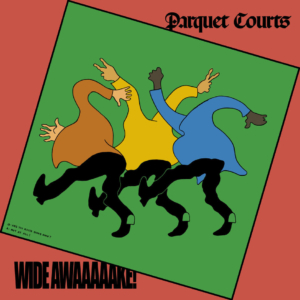 Well, sort of, yeah. On this album, in particular, Andrew and I spent a lot of time fleshing out bass lines together. He’s a really great bassist himself. When we knew it was time to start demoing stuff, we started an email thread about what vibe we wanted the record to have. We all got on the same page by sharing playlists of songs we were listening to and being inspired by. Also, to that point, we spend so much time together anyways that we’re always listening to the same music in the van. It’ll be really easy for [drummer Max Savage] and I to work out some crazy Fela Kuti groove. Not that it’s easy to play, but we each know what we’re referencing because we were listening to “Zombie” in the van. So we’re always listening to the same music and picking up on the vibe.
Well, sort of, yeah. On this album, in particular, Andrew and I spent a lot of time fleshing out bass lines together. He’s a really great bassist himself. When we knew it was time to start demoing stuff, we started an email thread about what vibe we wanted the record to have. We all got on the same page by sharing playlists of songs we were listening to and being inspired by. Also, to that point, we spend so much time together anyways that we’re always listening to the same music in the van. It’ll be really easy for [drummer Max Savage] and I to work out some crazy Fela Kuti groove. Not that it’s easy to play, but we each know what we’re referencing because we were listening to “Zombie” in the van. So we’re always listening to the same music and picking up on the vibe.
Andrew and I started writing the record together while we were listening to a lot of Fela Kuti and other bass heavy stuff like the Wailers and the Upsetters as well as Brian Eno, who I’m obsessed with. We were just trying to find a way to give the bass a lot of room to explore so the guitars could have more freedom to go crazy. That’s exciting because as a punk band, you can usually have that same thought and say, “Whatever, we’ll just play the root note of the song,” and still go crazy. We wanted to really flesh it out so that we maintained a song and a melody. Underneath whatever aggression and chaos the guitars and vocals may be contributing, there’s still something recognizable and hooky underneath there. The bass was the instrument we gravitated toward, and it’s no surprise that’s the case.
I’m not even a bass player originally. I had never played bass until being in this band so I’ve learned a lot just listening to music as a bassist and understanding the way I could have a role and be more dynamic than just playing the root note.
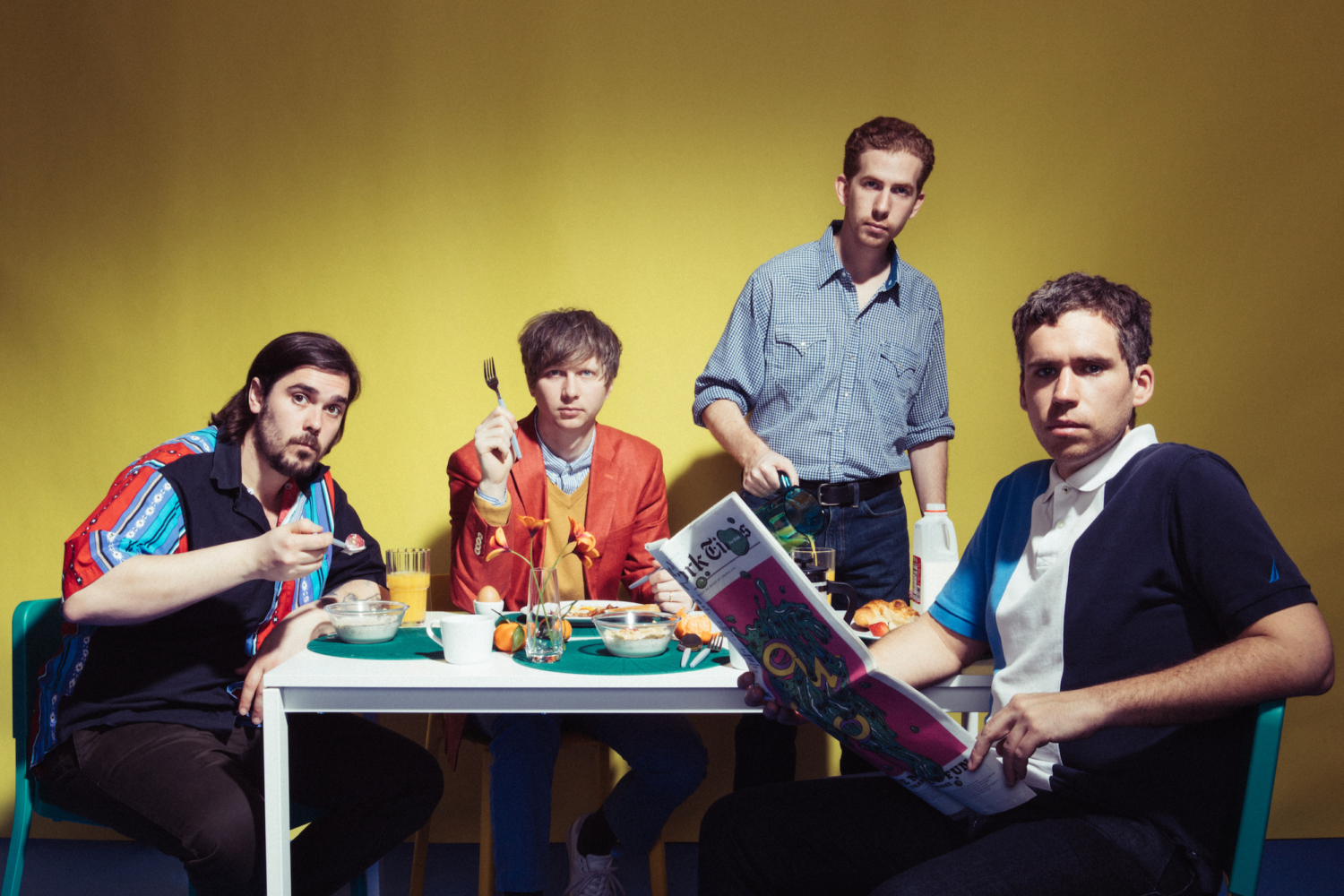
That’s awesome. So what bass players have been inspiring you?
I really love Mike Watt a lot. I watched that Jaco Pastorius documentary and now I’m really obsessed with his energy and his disregard and devil-may-care attitude. Basically, anything he touched on the fretboard, even if it was or wasn’t technically amazing, so much of it was just raw emotion. Using feedback and hitting the instrument became a tool for him to paint really broad strokes of emotion. I’m really attracted to that especially because playing bass in the band when we were starting out was really frustrating. I’d always been a guitar player and guitar players – at least in the music that I played – were encouraged to not necessarily focus too much on technicality. Of course, there are extremely technically proficient guitarists, but in the punk scene that I grew up in there was a lot more of people wailing away in the relative space of the key that the song is in – and sometimes not even that. There’s so much more than you can get out of a guitar and be messing up with it. You can just be going hog wild on the thing. In my old band, I used to break strings as part of a song. I’m not saying it was brilliant, but it was easier to get away with. With bass, I felt kind of trapped and naked because if I messed up it was really noticeable. I guess to that extent, I’ve become really obsessed with listening to bass lines that I hadn’t noticed before. Like that Elton John song “Saturday” has an insane bass line if you really listen to it. Same with “New York Minute” by Don Henley.
Also listening to any of those awesome tapes from Africa like the Nigerian psychedelic records. I don’t know a lot of those bassists by name, which sucks to say. That’s another weird thing about being a bassist. I have a ton of respect for the instrument and the musicians that stand behind it, but I also recognize that bassists aren’t the most… If you stand out as a bassist in a band you’re either showboating or you’re so exceptionally talented that people know your name. I’m not trying to show off or anything, but I have a lot of drive to do the best that I can. There are so many bassists out there that have inspired me along the way. I love Herbie Flowers and his style. I even set up one of my basses before we recorded to be as close to what he used on Serge Gainsbourg’s Histoire de Melody Nelson as possible and implementing some of the tricks he used, like putting a mute in the bridge or whatever.
To be honest with you, it wasn’t until this Parquet Courts record that I really saw and understood the way to use this instrument really well without it having to be over the top. Sometimes when we’d play shows on other album cycles, there are songs where I play one note the entire song. It’s kind of cool as a weird exercise. We have a song on Sunbathing Animal called “Sunbathing Animal” that is one note for seven minutes or something, but it’s really crowdy and fast so it’s hard to play. It doesn’t look or sound like it would be. I know when we played that song on tour I would always try to play it like a guitar player, like, “I’m just gonna shred!” At some point recently we were playing it and I realized I was always playing it so wrong. It wasn’t until this Parquet Courts record that I finally abandoned the idea of bass being like a guitar.
I think a lot of people do see it that way. But to your other point, there’s a quiet confidence you have to have as a bassist. I like that you keep coming back to the African music because I can hear some of that on the record. On the title track you’ve got that great bass line and then the guitar comes in with a kind of counterpoint like you’d hear in African music. Is that how it came about?
Absolutely. I remember writing that bass line. Andrew and I were at my house in Pennsylvania in the barn. We were watching a live Fela Kuti performance. I think it was that song “Lady”, maybe. It was so insane because the rhythm section was holding down so tight the entire time and then every other member of the band would step out for anywhere between 16 and 64 bars on every other instrument besides bass and drums. When I was listening I thought, “There’s so much pressure on that rhythm section right now.” They’re the only thing that’s consistent. If they mess up at all, it’ll sound awful. Even when it’s kind of simple sounding – which I think the bass line to “Wide Awake!” is pretty simple – but after you play it for a few bars you think, “Oh shit, I have to keep playing this for another minute and a half.” Then if you mess up everyone can tell. That song was born out of the same concept. In a way, I think that after we wrote that bass line, we were kind of like, “Let’s just do that with as many of the songs as we can.”
Download the “Wide Awake!” Bass Line Transcription
How was it working with Brian Burton, aka Danger Mouse? What did you get out of working with him?
I got a lot out of it, let me tell ya. On the very first session that we had with Brian, we were at Electric Ladyland and he had Max and I listen to a Devo demo and maybe a Stooges song. Then he said, “Listen to these songs a couple of times, go into that room, and play your interpretation of it.” I think it was actually that James Chance song “Contort Yourself” or something. I know that because the bass line for the song “Normalization” came out of this exact moment. He took a lot of time to show us that each of our roles was singularly important but that ultimately whatever we came up with had to gel with everything else. It wasn’t outside of the realm of stuff we’d done without a producer, it was just that hearing it said to us in that way was refreshing. It is about everybody doing their best but ultimately certain things are greater on the whole. He was really great at nurturing our curiosity about tone or approach. He’s incredibly knowledgeable about music. He and I would make references to random records and songs that was really natural and exciting and fun. I think he just can read a room and read people really well. As a producer he’s great. He wasn’t directing a lot, but he definitely formed a lot of ideas in real time that helped us so the session never got stale or anything. I think that shines on the record because a lot of the songs are first or second takes. I feel like I can play all those songs substantially better live now. Even though that happens naturally over time anyway, it’s one of those things where I’m like, “Whoa, this is so fresh sounding but also just tight enough.” You can hear subtle mistakes here and there but there are no real cuts or patches. It’s pretty raw and live.
I think that all of us worry about overproducing being an issue. We’d only ever worked with one producer before and I should say that I owe the guy a lot of credit. We did a record called Milano produced by Daniel Loopy. He is the person who initially sparked my obsession with playing bass well and with confidence. It was a really weird creative process that was super fun. He gave us references for songs and then wanted us to try to play them after hearing them once. He and I would get together and talk about bass tone. Like I was saying earlier, I was always applying stuff I knew about guitar and guitar amps and guitar tone to the bass. It was weird because in my mind I thought, “If I know about the sweetest tone settings on an Ampeg or Sunn for guitar plus tricks for pickups and weird string stuff for guitar, I can just apply all that wacky knowledge to bass.” I thought it was had fewer strings that had less responsibility, or something. I was just wrong. I wish I could go back in time and have the same attitude as I do now. I feel like it took me a while to understand how important it is, which is sort of an insane thing to say on the record, but for what it’s worth I was a dumbass for a really long time.
Was there a single takeaway that changed your thinking on it?
I think it was a few different things. For self-care at home, I’m never not sitting around playing an instrument. Right now I’m driving an hour and a half to play music with someone for a couple of hours. Music is something I always have going on. Even when I’m with my kids, I’m recording them and trying to make music off of them. It’s just my happy place, I guess. With bass, I never felt like it was a bass I could just pick up and relax with. I always felt like it was like your friend that was invited to a party but was only cool at the party and if you were with him alone he was really annoying or frustrating to be with. I’d never just pick up a bass. It always bummed me out because here I was playing bass in a band that’s actually doing stuff, but at home, I was never going to pick it up and play it.
I was reading this book called Songwriting Secrets of The Beatles and there was a whole section on bass and slash chords, basically. Paul McCartney was paraphrased talking about being able to use the bass to expand on a scale that a guitar is already playing in some capacity. Like playing a G when the guitar is still playing an F. I was fascinated by that because I never thought about how the instrument can have a support system and guide the direction of a guitar or vocal melody. Sometimes it can be completely subliminal and doesn’t have to be in the mix the same way. Once I had that snap in my mind while reading this Beatles songwriting book, I started going over my old guitar demos or recordings that I had at home with my kids or whatever going on and I’d start to play bass over them. It became the way I understood and could be comfortable with the instrument, by using it to accompany random sounds. I don’t know how well that works for an answer, but that was kind of my moment that I realized the role of the instrument wasn’t to fill in space that was lacking, like a low end, but really to be a guide for direction in a song. Once I realized that I realized how much control I had to sculpt the mood with my instrument and it’s come in handy so much ever since with improvising and just having fun with it. I’ve got a whole new lease on life with the damn thing.
I think it takes a while for most bass players to find that, and not everyone does.
Totally. It felt like Keanu Reeves in Point Break when he realizes that surfing is a source. My journey has been not unlike Johnny Utah’s.
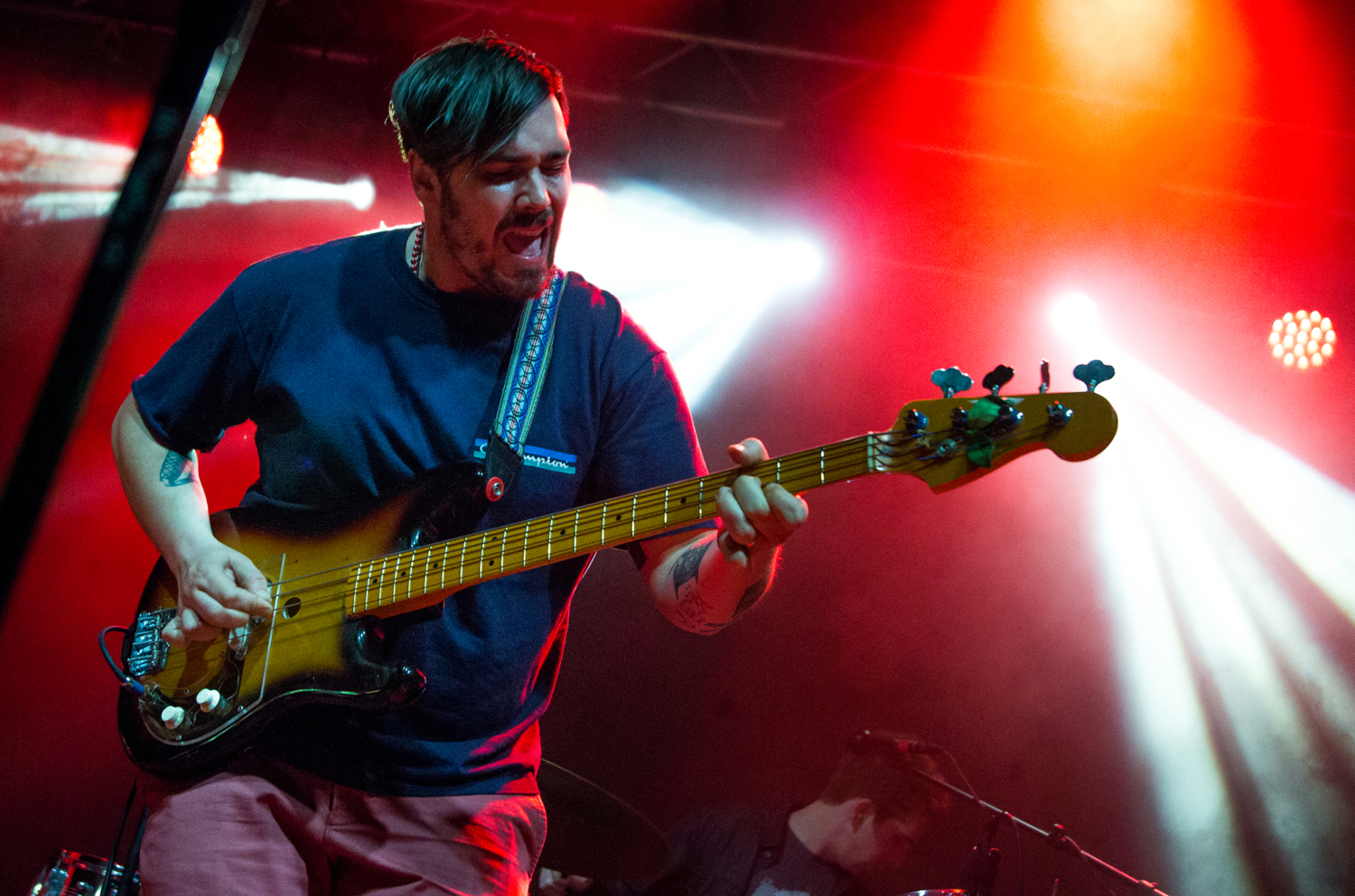
Can you tell me about your bass? It looks like you just have a random hole routed in it.
Haha, yeah. I have a really weird bass right now. It’s a bass I kind of put together myself. I had an ’84 Fender Bullet bass, which is what the body of it is. I don’t know what the deal is with that hole, but I can explain how I discovered it. We were leaving for a European tour last summer and both of the basses that I packed never showed up when we landed. They subsequently never showed up on the entire tour, then they got delivered back to me and they were both broken. Someone had gone through my cases. It was such substantial damage that the necks were cracked on both and they were littered with TSA agent pamphlets. The disregard for these instruments was crazy. I had this ’50s P-Bass reissue and my Bullet bass. I loved the pickups from the Bullet bass so I took the neck off of it and put the P-Bass neck on the body, but then the pickguard didn’t fit because the neck is a little wider at the end of the P-Bass. I ordered an acrylic pickguard because I thought it would be funny and a passive-aggressive way to show TSA agents that I don’t have drugs hidden inside of it. I had to cut the pickguard with a circular saw because it didn’t fit in where the neck met the body. Then when I took the original pickguard off I found that hole drilled in the middle of it. I never knew why. I just assumed that if I took the pickguard off of any bass it would be there. Anyway, that’s my main bass. I use it with flatwound strings.
Your technique is cool, too, because you get that throaty sound from playing in that middle register of the neck.
It’s inspired by Faust and that tick-tack bass sound you hear on old Johnny Cash songs. On a lot of songs we record, I’ll overdub the bass part with a baritone or a Fender VI or something. I feel like my whole game is trying to control the mids. I like when I can get cool harmonic tones or pinch harmonics every once in a while. I love it. Just with any trick like that, because of how much fun they are to do, it’s a thousand times more annoying for people to hear. I really enjoy being able to be able to hang onto the feedback that comes from one of those harmonic notes and still continue to play the bass line in a different position on the neck while there’s a mid-sounding drone over it. You know, for a split second, but it feels awesome. It’s like skateboarding when you ollie over a curb. It just feels nice. I guess I’m always kind of messing around up there.
I don’t use any effects or anything, so I’m pretty much trying to go between a rock setting and a funk setting. Our sets are really fast and have little to no time in between the songs to change. It’s incredible to me how much you can change the feel of the instrument with just the tone knob. I’m having a lot of fun with it.
Do you go old school with the amps?
When we record I like to use old Ampeg SVT’s. Now when we play live I have an SVT Classic and a 4×10 cabinet. I do have this Ampeg pedal that theoretically you could use to emulate any Ampeg amp with, like Ampeg tone in a box, but I’ll use that mostly for the boost. I tend to mess around a lot with the preamp ins and outs on the back of my head, lately. I really try to push the thing as hard as I can. It’s fun to see… not really how loud I can get it, but how many tones I can get out of the speakers before the head explodes. I’ve definitely busted it three or four times now finding all kinds of crazy combinations. I’m always channel-jumping and adding extra things in there. It might be annoying to be around me in a musical setting, but I’m really enjoying it.
It seems like exploration and experimentation are just part of your bag.
Absolutely. It’s super fun. That’s why I’m dying to get my hands on a fretless bass. Oddly enough, when we were recording our very first record, American Specialties, it was all Andrew’s songs. It was before I met the other guys in the band besides Andrew. He would have me come in and record bass lines over the songs that were already there. I didn’t even have a bass at that point. My roommate was in a band with a kid that left his bass in his closet. It was an Ibanez fretless bass or something. It was a hideous instrument that had an alien head sticker on it. You’d see it for $50 in Guitar Center. I said, “Whatever, that will do.” The fretboard was lined, so you could still see what you were playing but it had what I thought at the time was that wacky fretless bass sound. Now I’m just obsessed with getting a fretless, especially after watching that Jaco documentary. I think I’m going to take the frets out of one.
Wide Awake! is out now on CD, vinyl and as a digital download (iTunes and Amazon MP3).
Parquet Courts Tour Dates:
| Date | Location | Venue |
|---|---|---|
| Aug 2 | Chicago, Il | Thalia Hall |
| Aug 3 | Chicago, Il | Lollapalooza |
| Aug 4-Aug 5 | Missoula, MT | Travelers' Rest Festival |
| Sep 17-Sep 22 | Lincoln, NE | Lincoln Calling Festival |
| Sep 23 | Seattle, WA | The Showbox |
| Sep 24 | Vancouver, BC | Imperial |
| Sep 25 | Portland, OR | Wonder Ballroom |
| Sep 27 | San Francisco, CA | The Fillmore |
| Sep 28 | San Jose, CA | The Ritz |


